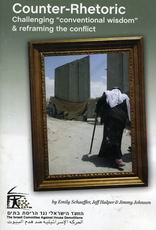
Counter-Rhetoric
Challenging "conventional wisdom" & reframing the conflict
Schaeffer, Emily; Halper, Jeff; Johnson, Jimmy
http://www.connexions.org/CxLibrary/Docs/CX8302-Counter-Rhetoric.pdf
Publisher: Israeli Committee Against House Demolitions
Year Published: 2006
Pages: 40pp Resource Type: Pamphlet
Cx Number: CX8302
This useful little book does two things. It challenges the rhetoric, the perceptions and assumptions regarding the conflict in Israel/Palestine, and it exposes the underlying imbalance of power around which this rhetoric swirls. It is both useful as a historical guide and as a tool for countering the prevailing divisive rhetoric. Whether challenging the concepts embedded in Zionism, the wars of the mid 20th century and the later occupation, or the Wall as security argument, this book gives a systematic alternative to the prevailing mantras and begins the process of changing the viewing of the conflict.
Abstract:
Counter Rhetoric, a pamphlet published by The Israeli Committee Against House Demolitions; a non-violent group made up of members of various Israeli peace and human rights organizations who oppose the Israeli demolition of Palestinian homes in occupied territories; proposes an alternative understanding and solution to the conflict between Palestinians and Israelis. Schaffer et al. argue that when resolving conflicts one must frame the debate into a clear message according to international law, social justice and the environment. However, framing is equally important as providing the FACTS. Israel's official framing of themselves as a peace loving country on the existential quest for survival, which acts in self-defence against Arab terrorism; ignores the fact of occupation. Furthermore this creates the dichotomy of winner and loser since Israel claims exclusive ownership of the country's land.
ICAHD rejects this framing in favor of reaching a political accommodation which takes into account both the survival and moral integrity of Israel. They uniquely reframe the conflict based on Zionism, a different understanding of the region's history and Israeli policy formation, and their experiences with Palestinian partners to address the underlying causes. For example, they blame the official security paradigm that endorses Muslims, Arabs and Palestinians as the ultimate enemy as the cause of further conflict, reject the "clash of civilizations" and timeless enemies argument and reject labelling terrorism as the root cause.
Their "post-Zionist approach" relies on cultivating a political arrangement that gives each national group room to express themselves as a nation, while also preserving the fluidity of residence and movement needed in such a shared space. Thus, they support the creation of a common, bi-national or democratic state, which includes both groups and an arrangement respecting the human and national rights of all peoples. Furthermore, the authors believe that terrorist violence will cease once the root claims and grievances of the both groups involved are met. Finally the ICAHD recognizes the asymmetry of power between the two sides and thus believes that Israel has the ability to end occupation: the main obstacle to attaining peace and regional security. However, Israel will only end occupation once it is made to comply with international law and human rights standards.
[Abstract by Amanpreet Dhami]
Subject Headings


